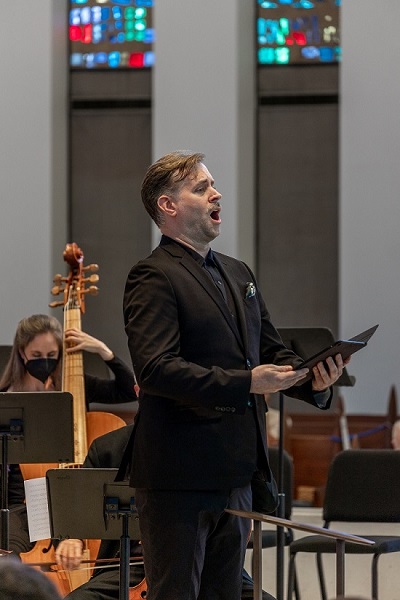Bach Consort considers old and new perspectives in diverting season opener

Paul Max Tipton sang the role of Phoebus in Washington Bach Consort’s performance of Cantata No. 201 Sunday afternoon. Photo: Kate Wichlinski
Washington Bach Consort opened its new season with a worthy program juxtaposing early music and contemporary music on Sunday afternoon. The group, conducted confidently by Dana Marsh, returned to its accustomed venue, National Presbyterian Church, for the first time since renovations started there in 2019. The concert paired a world premiere, by Trevor Weston, with one of Bach’s most pleasing secular cantatas, Cantata No. 201 (Geschwinde, ihr wirbelnden Winde).
Weston’s A New Song, commissioned by the Consort through the J. Reilly Lewis Legacy Fund, had much to recommend it, but also some shortcomings. Although Weston wrote in a program note that he “did not want to write a new Bach cantata,” he conceived his cantata in response to the Bach work. Weston used his own rather clunky libretto (“Now seems old, not avant, Next is best, sets better text” is one indigestible excerpt) to examine the same questions as Bach’s cantata: why do we make music and listen to it, and what makes it good?
The choral movements at the start and end of the piece were in a disappointingly uniform style, homophonic writing with little variety. Weston’s rich harmonic and melodic palette provided considerable interest, with light dissonance sometimes salting a generally tonal background. Using essentially the same orchestra as Bach’s cantata, Weston gave some lush writing to the strings, as in the second movement, where the three soloists, soprano Sherezade Panthaki, mezzo-soprano Sarah Davis Issaelkhoury, and tenor Jacob Perry, Jr., also sang as a single unit.
Panthaki stood out for the potency of her voice, especially in the fifth movement, featuring a striking duet interaction with Colin St-Martin on the breathy transverse flute. Issaelkhoury’s plangent tone gave an edge to the fourth movement, its words drawing attention to music of the past “erased or told by others.” Perry’s solo in the sixth movement finally provided more active textures, a relief to the general air of misty-eyed reverence that reigned over so much of the work. A modern updating of the question about who judges music, the piece felt timely but ultimately unsatisfying.
Part of Weston’s problem was inevitable comparison to the Bach cantata, a work that brims with humor, strong opinions, and bracing musical variety. Bach, who never composed an opera per se, came the closest to that dramatic genre in his secular cantatas. None more so, perhaps, than this cantata, subtitled “Drama: The Contest between Phoebus and Pan.” The libretto, by Christian Friedrich Henrici, features a music competition between the two gods.
The WBC Chorus responded with its accustomed clarity and ideal balance among parts, even in Bach’s complex writing, with so many more challenges than anything in the Weston piece. In the bustling choral opening, the flutes and oboes whistled and swirled as the chaotic winds, banished to their cave so that the music contest can be heard clearly. Josh Cohen mastered the perilous natural trumpet solo, marked by a flawless high note held seemingly for an eternity.
Paul Max Tipton’s polished bass-baritone communicated all the vain assurance of Phoebus, whose blockbuster aria, “Mit verlangen,” is awarded the prize. With strong breath support, he plied a creamy legato tone to this poignant piece, negotiating the extremes of range with grace and musicality. Bass-baritone Ian Pomerantz made a playful foil to him as Pan, appropriately zesty and silly in his gamboling aria “Zu Tanze, zu Sprunge.”
Panthaki’s turn in the Bach cantata, as the satirical critic Momus, was less assured, as her tendency to rush ahead of the beat unsettled her aria, “Patron, das macht der Wind.” Her puissant top notes, however, rang out in the church’s nave during her final recitative. Issaelkhoury’s low range came into play in a more pleasing way in her showpiece, Mercurius’s aria “Aufgeblasne Hitze,” with its complicated double flute parts.
In an arrangement that seems unfair for a music competition, each singer is allowed to select a judge, who not surprisingly sides with his singer. Jacob Perry’s lyrical tone suited the role of Tmolus, whose judgment in favor of Phoebus is agreed to by all present, except for one. Mydas, chosen by Pan, insists that Pan has carried the day. Tenor Patrick Kilbride brought out the sound of a donkey braying in his aria “Pan ist Meister,” a prefiguring of the punishment of ass’s ears he will receive from the thin-skinned Phoebus.
Washington Bach Consort will perform a concert devoted to the music of Henry Purcell, including his Ode on St. Cecilia’s Day, 4 p.m. October 30. bachconsort.org






